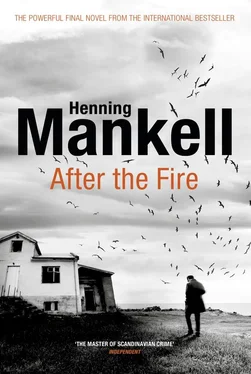We also spoke about the burned-out house. She told me she often dreamed about it, saw it rising from the ashes. Another recurring dream she dismissed as embarrassingly childish. Every morning the Carpenter Elves had raised the wooden walls by one metre, using their old-fashioned skills. Nobody knew where they came from, nobody heard the sound of their hammers during the night. The house kept on growing, but the ruins were still there, black and cold, just as they had been after some unknown person came along and set the fire.
I promised Louise that our house would be rebuilt; I stressed that promise again on the day she told me the baby’s name was Agnes.
‘In the old days people used to give their children several names,’ I said. ‘Even if they were poor, they could shower their children with a wealth of names. I had a classmate with seven Christian names, even though he was the poorest of the poor in my school.’
‘Do you remember the names?’
‘Karl Anton Axel Efraim Hagbert Erik Olof. His surname was Johansson.’
‘My daughter will only be called Agnes,’ Louise said. ‘She’ll never be in any doubt about what her name is.’
One morning I noted the fact that Agnes was one month old as I took my morning dip in the ice-cold water. The weather was changeable, as temperamental as an irascible human being. It snowed, the snow melted, the wind blew from all directions, then there was the kind of windless calm that really belongs to high summer. It could rain for four days non-stop, with constant cloudbursts hammering down on the fragile roof of the caravan.
No one knew what was going to happen to Oslovski’s house. There were rumours about the lights being on from time to time, so people started to believe the place was haunted. Someone mentioned her glass eye, claiming that at night it was transformed into a sparkling prism which seemed to find light in the darkness. At least these rumours meant the property was safe from break-ins or vandalism.
The gravel drive was always pristine; no one went near the house. It was as if people doubted whether Oslovski had actually died. Perhaps she had just gone off on one of her mysterious journeys; no one knew where she went or why. Except to track down parts for her car, which remained missing.
‘It’s always been desolate around here in the winter,’ Jansson said one day. ‘But now it’s worse than ever. As if empty can become emptier.’
I knew what he meant. The silence in the archipelago intensified during the winter. It wasn’t just the quayside crumbling away and the iron bollards rusting; it was as if the sea itself didn’t really have the heart to fill the harbour basin with water any more.
At Oslovski’s wake I took the opportunity to ask Jansson if he would sing at our New Year party. He recoiled as if I had suggested something inappropriate.
‘It would make the party just perfect,’ I said with a smile.
Jansson chewed his lower lip like an awkward schoolboy who hadn’t done his homework.
‘I can’t sing any more.’
‘Of course you can!’
‘And besides, “Ave Maria” isn’t the only song I know,’ he said stubbornly.
‘Fine,’ I said. ‘That’s fine.’
We didn’t discuss it any further, but I knew I had his word. He would sing when we were gathered in the caravan, as midnight approached.
I went through the catering one more time with Veronika. We had settled on hot-smoked salmon for the main course, with soup to start and apple cake to follow.
‘I would have invited you,’ I said. ‘But there isn’t enough room in the caravan.’
‘I’m going to Iceland on New Year’s Day,’ she said.
I looked at her in astonishment.
‘Iceland? Isn’t it even colder there than it is here?’
‘I don’t care about the weather. I’m going because of the Icelandic horses.’
‘Is that where you might move to?’
‘Perhaps.’
Her phone rang; I gathered from the conversation that it was someone enquiring about a birthday party. I picked up my jacket, pulled my hat down over my ears and waved to her. She smiled at me as she began to make notes on a turquoise pad.
There was an old newspaper lying on one of the tables, so I checked my betting slip. I hadn’t won anything, of course.
I headed home, the boat buffeted by choppy waves. I felt as if the sea might solidify at any moment, petrifying the waves, the spume, the boat and me.
A grey sea like this one was like a clockface without hands. Or a room where the walls have fallen down. Sometimes I had a vague premonition that the sea was the force that would one day take my life.
In order to avoid the even rougher waters as I reached the part of the bay leading to the open sea, I followed the inner shipping lane. It was a longer route, but it was sheltered from the north wind almost all the way, except for the very last part of my trip. I passed an island where the bare branches of the oak trees reached up into the sky. I thought I caught a glimpse of a wild boar slipping away into the undergrowth. I let the engine idle and allowed the waves to carry me, hoping the animal would reappear. The next island was called Hästholmen; a geology professor called Sandmark had once built a summer cottage there. I had seen him when I had accompanied my grandfather to the harbour as a child. Sandmark always wore a black beret and a baggy British khaki uniform, and he lived until he was a hundred and seven years old. Back then it was Jansson’s father who delivered the post; according to Jansson, Professor Sandmark had died on his jetty, having just received a pension payment. Jansson’s father had been standing there with the notes in his hand when Sandmark sank silently to the ground and died on the spot.
Jansson’s father had been particularly upset by the fact that the professor had collapsed without so much as a groan of pain, fear or protest.
The summer cottage was in a terrible state. I didn’t know for sure, but I thought it was owned by two granddaughters, two sisters who hated each other because one had become rich while the other had failed in life.
My phone rang; it was Jansson.
‘I’m sure,’ he said.
‘Sure about what?’
‘That the arsonist isn’t local.’
‘Did anyone ever really believe that? Apart from when I was the prime suspect.’
‘I’ve gone through every single person who lives out here on the islands. It can’t be any of them.’
‘What do we really know about people?’ I said. ‘What do you know about me? What do I know about you?’
‘Enough to be confident in what I’m saying.’
I had the feeling that our conversation was going round in circles.
‘What do the police think?’ I asked, purely for the sake of something to say.
‘I imagine they probably think the same as me, but where do they start looking?’
Jansson chuckled, as if he had said something funny, then he became serious again.
‘I’d really like to hear your view,’ he said. ‘On who’s behind all this. These house fires.’
‘I’ll give it some thought, but right now I’m out in the boat. It’s cold.’
‘We need to talk about this.’
‘You’re right, we need to talk about this. At some point.’
I ended the call and put my phone back in my pocket. Something about our conversation was bothering me. Even though Jansson had spoken as he always did, something wasn’t right. I just couldn’t work out what it was.
What did I really know about Jansson, apart from the fact that he had delivered the post for years in all weathers? He had an extensive knowledge of everyone who lived out on the islands. Everyone knew Jansson, the helpful postman in the archipelago. But who really knew him?
I went over the conversation in my mind. I didn’t feel any better, and I still couldn’t decide where the anxiety was coming from.
Читать дальше












